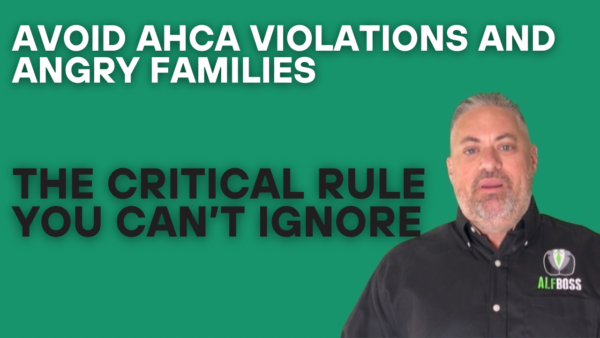
Avoid AHCA Violations and Angry Families: The Critical Rule You Can’t Ignore
In assisted living, managing resident care isn’t just about health and safety—it’s also about communication. When families are left in the dark, it can lead to angry confrontations, damaged trust, and potential legal battles. Imagine the worst-case scenario: a family gets a call from the hospital about their loved one, completely unaware that anything was wrong. Now you’re not just dealing with a medical situation; you’re handling outraged family members and risking scrutiny from AHCA.
To avoid these situations, compliance with 59A-36.007 Resident Care Standards is non-negotiable. This regulation mandates that facilities act immediately when a resident exhibits a significant change. Here’s how you can protect your residents, your relationships with families, and your facility’s reputation.
What is a “Significant Change”?
A significant change is any major shift in a resident’s health or behavior that warrants immediate attention, potentially altering their care plan. This isn’t about minor issues but critical changes that require action.
Examples of Significant Changes:
- Physical Decline: Sudden inability to walk, unexpected weight loss, or development of bedsores.
- Health Emergencies: Stroke, heart attack, high fever, or other urgent medical conditions.
- Behavioral Shifts: Unusual aggression, confusion, or extreme withdrawal that could indicate mental health concerns or dementia progression.
- Emotional Changes: Severe anxiety or depression affecting daily functioning.
Your Responsibility Under the Regulation
According to 59A-36.007, if a resident exhibits a significant change, the facility must:
- Contact the Resident’s Health Care Provider
Notify the physician immediately to report the change and seek medical guidance. - Inform the Family and Other Key Parties
Reach out to the resident’s family, guardian, health care surrogate, or case manager. Keeping these individuals informed prevents misunderstandings, angry confrontations, and ensures everyone is on the same page about the resident’s care.
Avoiding Angry Families: Why Documentation is Key
One of the easiest ways to lose the trust of a family is to fail at communication. Here’s how to stay ahead:
- Document Every Contact:
- Record the names of individuals contacted, their role, the time and date, and the outcome of the communication.
- Example:
“1/19/25, 4:15 PM: Called Mary Johnson (daughter). Left voicemail explaining condition change. Awaiting callback.”
- Be Persistent:
If you can’t reach someone, don’t stop at one attempt. Call multiple times, send emails, and try other methods. AHCA expects a good-faith effort to notify appropriate parties. - Follow a Protocol:
If no one responds:- Attempt contact at different times of the day.
- Notify your supervisor and escalate as needed.
- Keep detailed logs to show AHCA that you made reasonable attempts.
- Proactively Communicate:
Don’t wait for the hospital to call the family. Families appreciate transparency and timely updates, even if the news is difficult.
Protecting Your Facility and Reputation
When families aren’t informed, it creates unnecessary stress for them—and unnecessary risk for you. Angry family members can file complaints with AHCA, pursue legal action, or share negative reviews that damage your facility’s reputation. By following 59A-36.007, you not only comply with regulations but also show families that you care about their loved ones.
Take Action Today
Train your staff to recognize significant changes and establish a clear process for documentation and communication. Don’t let a preventable issue turn into a crisis. Remember, compliance is not just about following the rules—it’s about building trust, ensuring safety, and keeping AHCA off your doorstep.